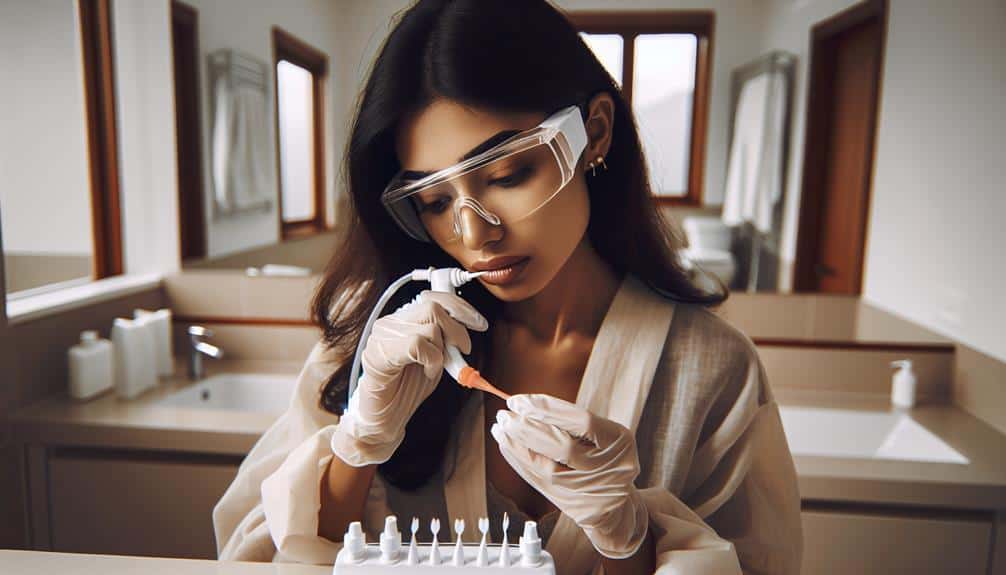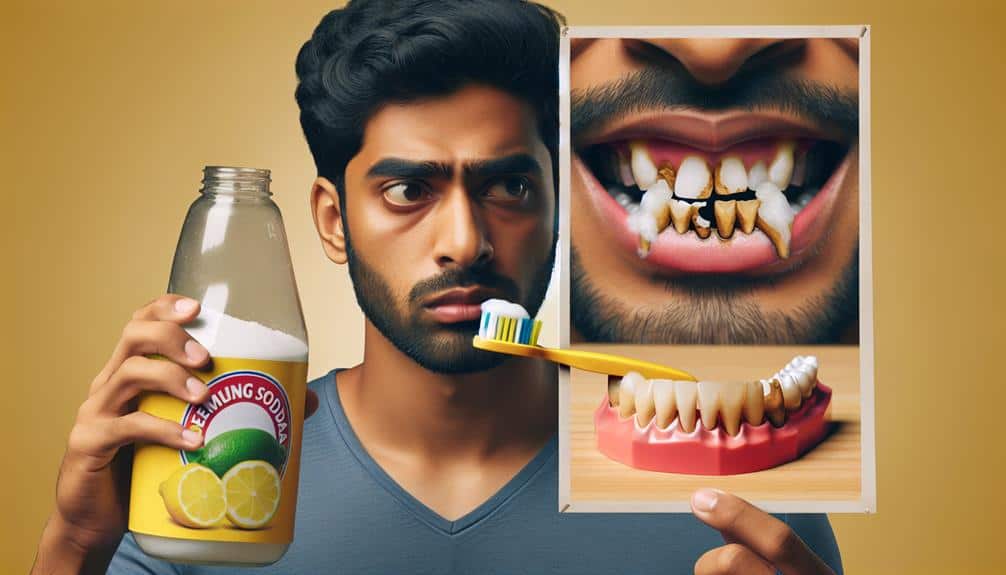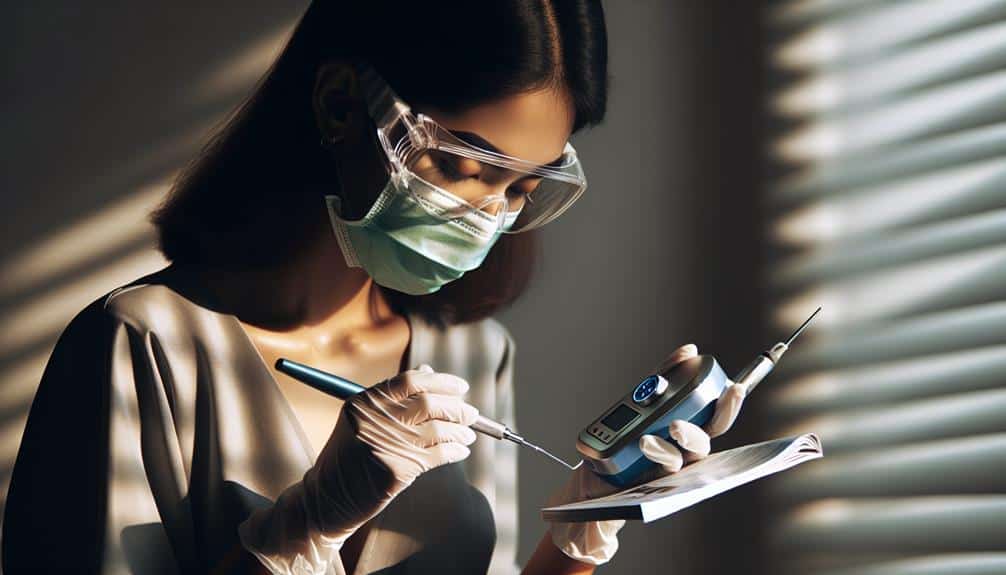When you're pregnant, it's vital to prioritize your health and your baby's safety, which also means being aware of the risks linked to teeth whitening while expecting. Chemicals in whitening treatments, like hydrogen peroxide, can potentially harm your developing fetus and may cause increased sensitivity in your gums and teeth during pregnancy. It's advisable to delay non-essential dental procedures, including whitening, and consulting with your obstetrician before considering any whitening treatment is essential. Remember to put your well-being and your baby's health first.
Key Points
- Chemicals in whitening products can harm the fetus by entering the bloodstream.
- Safety of whitening products during pregnancy is not well-researched.
- Professional whitening procedures are not recommended for expectant mothers.
- Consult healthcare providers for advice on safe whitening alternatives.
- Prioritize maternal and fetal health by avoiding unnecessary risks.
Potential Risks of Teeth Whitening
If you're contemplating teeth whitening while pregnant, it's important to be aware of the potential risks involved in this process. While teeth whitening is generally safe for most individuals, there are some precautions to keep in mind during pregnancy. One of the main risks associated with teeth whitening during pregnancy is the use of chemicals in the whitening products. These chemicals, such as hydrogen peroxide, may potentially be harmful to the developing fetus. It's essential to consult with your obstetrician before undergoing any teeth whitening procedure to guarantee the safety of both you and your baby.
Another risk to be mindful of is the increased sensitivity of your gums and teeth during pregnancy. Hormonal changes can make your gums more prone to irritation and inflammation, especially when exposed to whitening agents. This heightened sensitivity may lead to discomfort or pain during the whitening process. To mitigate these risks, it's advisable to postpone any non-essential dental procedures, including teeth whitening, until after giving birth. Your dental health is essential, but the well-being of you and your baby should always take precedence.
Harmful Effects on the Fetus
To protect the health of your developing baby, it's important to understand the potential harmful effects teeth whitening may have on the fetus during pregnancy. When considering maternal health, it's essential to recognize that any chemicals used in teeth whitening procedures can potentially enter the bloodstream and reach the fetus through the placenta. This direct exposure during vital stages of fetal development could pose risks to the baby's health.
The safety of teeth whitening products during pregnancy isn't thoroughly researched, and the effects on fetal development remain uncertain. As a responsible expectant mother, it's advisable to err on the side of caution and avoid unnecessary risks. The priority is to safeguard the well-being of both you and your baby.
Considering the delicate nature of fetal development, it's best to consult with your healthcare provider before undergoing any teeth whitening procedures while pregnant. Your provider can offer guidance tailored to your specific situation and guarantee the safest course of action for both maternal health and fetal development.
Safety Concerns for Expectant Mothers
When considering teeth whitening procedures during pregnancy, it's important to be aware of the safety concerns for expectant mothers. Your oral hygiene is vital during this delicate time, and some teeth whitening treatments may pose risks to you and your baby.
While professional whitening procedures aren't recommended during pregnancy due to the potential risks associated with the chemicals used, there are alternative treatments and natural remedies that can help brighten your smile safely.
Pregnancy complications can arise if you expose yourself to unnecessary risks, so it's paramount to prioritize caution. Opting for natural remedies like baking soda, activated charcoal, or coconut oil pulling can be effective in removing surface stains without harming you or your baby. Maintaining good oral hygiene practices, such as regular brushing and flossing, is also key to keeping your teeth healthy during pregnancy.
Chemical Exposure in Whitening Products
Chemical exposure in whitening products can potentially pose risks to both you and your baby during pregnancy, necessitating caution in selecting safe teeth whitening options. Many teeth whitening products contain toxic ingredients such as hydrogen peroxide or carbamide peroxide, which can be harmful if ingested or absorbed into the body. These chemicals may have adverse effects on fetal development and could potentially harm the unborn baby.
To guarantee the safety of you and your baby, it's vital to opt for natural or pregnancy-safe teeth whitening alternatives. Consider using products that are free from harsh chemicals and artificial additives. Natural remedies like baking soda, activated charcoal, or coconut oil can help whiten your teeth without exposing you and your baby to potentially harmful substances.
Before using any teeth whitening product during pregnancy, always consult with your healthcare provider to get personalized advice tailored to your specific situation. Your healthcare provider can offer guidance on safe whitening options that won't compromise your health or the health of your baby.
Consultation With Healthcare Providers
Prioritizing consulting with your healthcare provider before considering any teeth whitening procedures while pregnant is essential. When it comes to your health and the health of your baby, seeking healthcare guidance is vital. Here are four reasons why consulting with your healthcare provider is paramount:
- Pregnancy Precautions: Your healthcare provider will be able to advise you on the specific risks associated with teeth whitening during pregnancy and help you make an informed decision.
- Health Assessment: Your provider can assess your overall health status and determine if any underlying conditions may be affected by teeth whitening procedures.
- Alternative Options: They can suggest safer alternatives or natural remedies for achieving a brighter smile during pregnancy.
- Monitoring: Your healthcare provider can monitor your dental health throughout your pregnancy and provide guidance on maintaining good oral hygiene practices.
Frequently Asked Questions
Can Teeth Whitening During Pregnancy Affect the Baby's Future Dental Development?
Teeth whitening during pregnancy can impact the baby's enamel development and pose tooth sensitivity risks. It's important to prioritize your baby's dental health by avoiding procedures that could potentially affect their future dental well-being.
Are There Any Alternative Methods for Safely Whitening Teeth While Pregnant?
Seeking alternative methods for teeth whitening while pregnant? Consider natural remedies like baking soda or activated charcoal, but always prioritize safety precautions. Consult with professionals for home remedies and follow their advice for a healthy approach.
How Soon After Giving Birth Can I Resume Teeth Whitening Treatments?
After giving birth, it's best to wait until your postpartum check-up before resuming teeth whitening treatments. Prioritize your safety and consult with your dentist. Timing is essential to guarantee the procedure is done safely while considering breastfeeding concerns and dental care needs.
Can Teeth Whitening Products Cause Complications During Labor or Delivery?
You may be concerned about potential risks from teeth whitening during labor or delivery, but in reality, the focus should be on your well-being and baby's safety. Always consult your healthcare provider for guidance.
Are There Any Long-Term Effects on the Mother's Dental Health From Whitening Teeth During Pregnancy?
During pregnancy, teeth whitening may pose risks to maternal health and dental well-being. It's important to prioritize oral care without jeopardizing your baby's safety. Consult your dentist for guidance on maintaining a healthy smile while pregnant.


